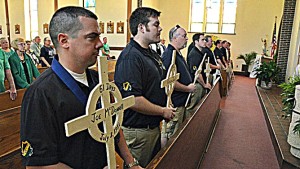 In the summer of 1981, 10 Irish republican prisoners held by the British in Long Kesh Prison made their mark on the long history of “the Troubles” through the simple, yet tragic, act of starving themselves to death in protest against the government’s refusal to accord them political prisoner status and respect their basic human rights.
In the summer of 1981, 10 Irish republican prisoners held by the British in Long Kesh Prison made their mark on the long history of “the Troubles” through the simple, yet tragic, act of starving themselves to death in protest against the government’s refusal to accord them political prisoner status and respect their basic human rights.
Northern Ireland has come a long way in the years since, notably with the culmination of the peace process in 2007. Still, more than 30 years later, the sacrifice of hunger strike leader Bobby Sands and comrades is still remembered around the world—and in our own back yard.
Members of the Ancient Order of Hibernians John Barry Division in National Park, Gloucester County, took to the streets on Sunday for a short march from their club on Columbia Boulevard to St. Matthew’s Church just a few blocks away. Escorted by pipers and drummers, the marchers held simple, whitewashed wooden Celtic crosses inscribed with the names of the dead, the length of their hunger strike, and the dates of their death. They processed into the church, and celebrated a short, simple Mass, in memory of those who gave their last full measure.
The march was once sponsored by the local division of Irish Northern Aid, of which Joe Bilbow was a member. When the county INA chapter ceased to exist, Bilbow resurrected the observance in 1990, when he became the charter president of the Barry AOH division.
“I made a promise that we would never forget our Irish history,” says Bilbow, now the division’s Freedom for All Ireland chairman. “Ten men gave their lives for Irish freedom. We remember that.”
The peace process has gone a long way toward healing old wounds, Bilbow acknowledges, “but it wasn’t easy to get where we are today.” The sacrifice of those 10 men, he says, played a important role in the evolution of Northern Ireland. As an organization, the Ancient Order of Hibernians remains committed to a non-violent political solution. But at the same time, Bilbow says, the Gloucester Hibernians believe it’s important to commemorate this critical chapter in the region’s long, bloody history. “We don’t make it political,” Bilbow says, simply. “We just do it to remember our honored dead.”
We have photos from the afternoon. Check them out, above.
